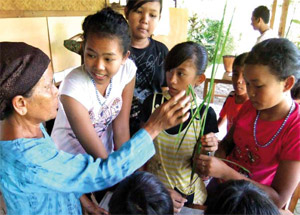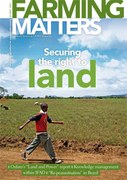For small-scale farmers and sharecroppers in Indonesia, the Green Revolution has caused a lot of suffering since it began in the 1970s. Ibu Nasah has lived a tough and often indebted life, but she still owns a 0.3 hectare paddy field, which she cultivates. After joining a community Farmer Field School in a nearby village she has now become one of the facilitators in the local school.

Farmers no longer sow their own seeds; there are no cattle to provide draft power or additional income on the farm; there are very few rice barns left in the villages and many people have had to sell their land. Exposure to harmful pesticides and mountains of debt are now the daily reality for most of Indonesia’s family farmers.
In addition to all this, traditional agricultural knowledge is being lost. Farming no longer belongs to the farmers, and most of the youth see no future in becoming a farmer.
The mothers of the junior high school girls in the picture were the “young generation of the Green Revolution”, but many of them now work abroad as maids in Saudi Arabia. Ibu Nasah has lived a tough and often indebted life, but she still owns a 0.3 hectare paddy field, which she cultivates. After joining a community Farmer Field School in a nearby village she has now become one of the facilitators in the local school.
Thanks to people like her, these junior high school students, the next generation on, are reconnecting to agriculture and to the paddy eco-system – no minor achievement when we consider that rice is the most important staple in this country of 240 million people. Thank you indeed, Grandma Nasah!
Text and photo: Tati Krisnawaty / Kaliaget Organic School

